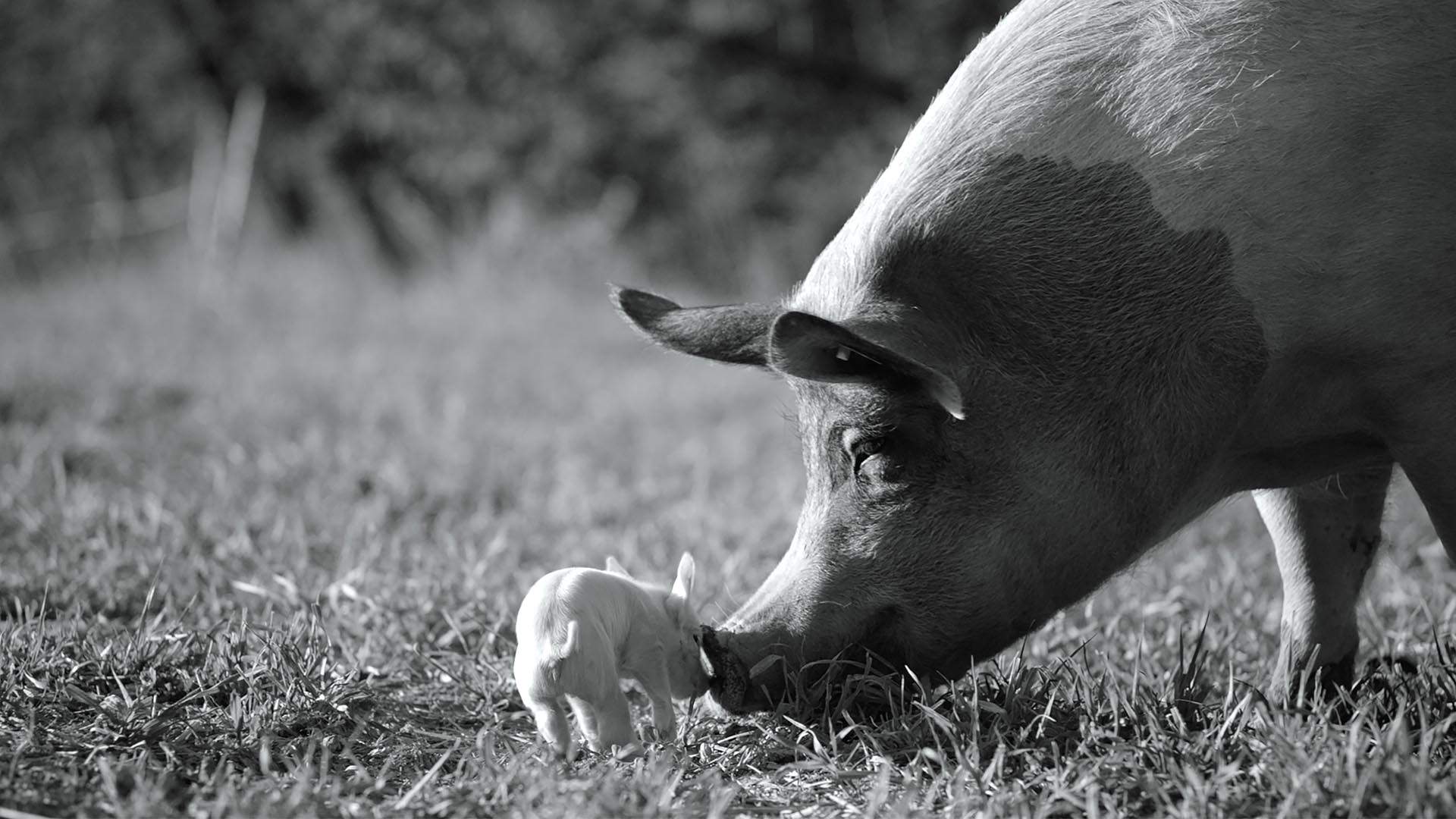Gunda
This dialogue-free documentary observes farm animals as they go about their daily lives, and the result is as haunting as it is striking.
Overview
Move over Babe, Piglet, Porky and Peppa. Thanks to monochrome-hued documentary Gunda, cinema has a brand new porcine star. Or several, to be exact; however, other than the eponymous sow, none of the attention-grabbing pigs in this movie are given names. If that feels jarring, that's because it breaks from film and television's usual treatment of animals. Typically on-screen, we see and understand the zoological beings we share this planet with as only humans can, filtering them through our own experience, perception and needs. We regard them as companions who become our trustiest and most reliable friends; as creatures who play important roles in our lives emotionally, physically and functionally; as anthropomorphised critters with feelings and traits so much like ours that it seems uncanny; and as worthy targets of deep observation or study. We almost never just let them be, though.
Whether they're four-legged, furry, feathered or scaly, animals that grace screens big and small rarely allowed to exist free from our two-legged interference — or from our emotions, expectations or gaze. Gunda isn't like any other movie you've seen about all creatures great and small, but it can't ignore the shadow that humanity casts over its titular figure, her piglets, and the one-legged chicken and paired-off cows it also watches, either. It's shot on working farms, so it really doesn't have that luxury. It features animals destined to play their parts in the food chain, a fact that can't be avoided. But, surveying these critters and their lives without narration or explanation, this quickly involving, supremely moving and deeply haunting feature is happy to let the minutiae of these creatures' existence say everything that it needs to.
The delights and devastation alike are in the details, and the entire movie is filled with both. Filmmaker Victor Kossakovsky (Aquarela) looks on as Gunda's namesake gives birth, and as her offspring crawl hungrily towards her before they've even properly realised that they're now breathing. His film keeps peering their way as they squeal, explore and grow, and as they display their inquisitive, curious and sometimes mischievous personalities, too. Sometimes, this little family rolls around in the mud. At other times, they simply sleep, or Gunda takes the opportunity to enjoy some shut-eye while her piglets play. Whatever they're doing, and whenever and where, these pigs just going about their business, which the feature takes in frame by frame. In one of the documentary's interludes away from its porcine points of focus, the aforementioned chook hops about. Whether logs or twigs are involved, it too is just navigating its ordinary days. In the second of the movie's glimpses elsewhere, cattle trot and stand, and their routine couldn't seem more commonplace as well.
It doesn't take a particularly observant person to notice the tag through Gunda's ear, or the fencing surrounding her and her fellow cast of creatures. No one need listen intently, their own ears figuratively pricked, to discern the noise of the human world beyond the sounds of nature. Evidence of people — even without even the slightest glimpse of a single one — is always there for viewers to see and hear, with Kossakovsky's engrossing and meditative documentary presenting it as plainly as it does everything else throughout its duration. The audience knows that these stories won't end happily as a result. It's well aware that humankind's intended use for the film's animals will trump the critters' own urges, desires and clearly apparent emotions. Indeed, Gunda screams its abhorrence of eating flesh without saying a word; to the surprise of no one who saw his Golden Globes and Oscars speeches in 2020, Joaquin Phoenix is one of its executive producers.
Everyone finds their own meaning in every movie, but patient, dialogue-free, near-hypnotic documentaries like Gunda enhance that sensation several times over. Staring at its intimate visuals — at the stunning, resonant and evocative sights it presents again and again — sparks a shower of thoughts, threads and questions, and, sans guiding words dictating what to focus on and why, each individual viewer will veer in their own direction. Some will be struck by the act of watching life come into the world, then shaken by knowing its ultimate purpose. Others might be shocked by the way that even the simplest trace of routine connects every living thing. Others still could come to think differently about their diet choices. All three and more are options here, because Gunda ensures that its audience isn't just seeing its pigs, chicken and cows in a strikingly realistic, authentic and compassionate fashion, but is also confronting and challenging their own personal choices around animals at the same time.
Gunda is an immensely empathetic film — director/co-writer/co-editor/co-cinematographer Kossakovsky was inspired by his own childhood experience, when he had a pig for a best friend — and also a work of astonishing skill. So seamless are Kossakovsky and fellow writer/editor Ainara Vera's (Aquarela) efforts that it's impossible to guess that Gunda and her piglets' lives in Norway are interspliced with scenes from British and Spanish farms. Every shot seen on-screen is so gorgeously framed and lit by the filmmaker and his co-director of photography Egil Håskjold Larsen (When Man Remains), and so vivid and textured in its inky black-and-white colour scheme, that avoiding the lure of its imagery is unimaginable. It's no wonder that taking in the documentary's every second feels like an act of surrender — visually, intellectually and emotionally, and to its layered and immersive soundscape as well. This isn't just a nature doco; it's a poetic musing on what it means for every creature to be alive and an examination of humankind's display of force over the natural world, and it's as staggering as it is stirring.





